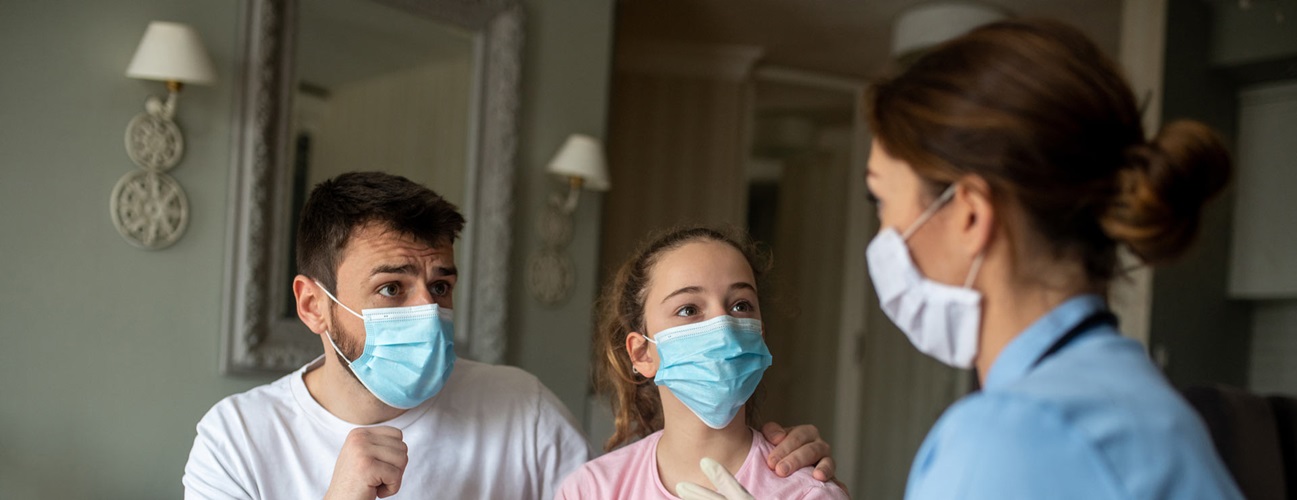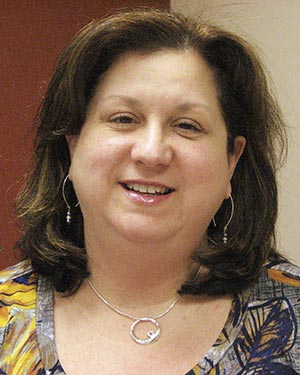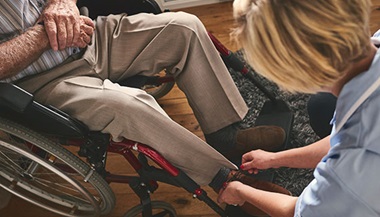Pediatric Home Health Care — What You Need to Know
Featured Expert:
What is pediatric home health care?
If your child is recovering from medical treatment or has a chronic condition, pediatric home health care is a way to provide treatments in the comfort of your home. These services allow children to receive care from licensed professionals in their own environment, often keeping them out of prolonged hospital stays. Susan M. Huff, M.S.N., senior director of Johns Hopkins Pediatrics at Home, explains why children need specialized home care and how the process works.
Conditions Commonly Treated with Pediatric Home Health Care
Child home care treatment is most common for children with chronic or severe conditions, such as:
- Complications from prematurity
- Cardiac disease
- Chronic pulmonary or respiratory illness
- Neurodegenerative disease
- Genetic disorders
- Developmental disorders
- Serious injury recovery
- Childhood cancer
- Nutritional deficiencies
- Respiratory conditions
What to Expect from Pediatric Home Health Care
Before Pediatric Home Care Treatment
Patients need a referral from their doctor before starting home care. Referrals are given during extended outpatient treatment, before hospital discharge or from your pediatrician. “There is always a conversation when a child is discharged from the hospital about what is appropriate,” says Huff. “Home care is a very good choice depending on the needs of the child and family.”
Some home care agencies offer services while children are in the hospital. Examples may include:
- Speaking with the family about the child’s condition and discharge care plan
- Teaching, delivery and setup regarding home medical equipment
- Scheduling of an in-home assessment to secure equipment needs and safety
Starting Pediatric Home Care Treatment
After hospital discharge, the child begins receiving home care treatment. Visit frequency, duration of care and treatment are personalized to the child’s needs and the physician’s medical orders. After each visit, the home care agency shares its information with the referring pediatrician. “Everything we do in the home is driven by our relationship with the physician,” Huff explains. “Our orders for frequency of clinician visits — all of that is driven in collaboration with the child’ physician.”
Care plans adjust over time as treatment needs change.
Types of Pediatric Home Health Care
Every home care agency has different service offerings, so check with your preferred provider. Huff recommends groups specializing in pediatrics. “It’s a unique perspective that is very different than adults,” she says. “Pediatric home care is a specialty.”
Child home care services include:
Pediatric Nursing
Pediatric nurses perform evaluations, give medications and teach families about care. Nurses also deliver some specialty treatments, such as infusion therapy. Nursing staff members adjust the child’s care plan as needed.
Pediatric Occupational Therapy
Occupational therapy develops abilities to help with daily needs such as breast or bottle feeding and reaching developmental childhood milestones. Treatments focus on fine motor skills or hand-eye coordination. Children needing occupational therapy likely have one of the following conditions:
- Prematurity
- Chronic illness with feeding disorders
- Genetic disorders
Pediatric Physical Therapy
Pediatric physical therapy focuses on improving motor skills, strength, and balance. Physical therapy is often used for children:
- Who are recovering from acute injury
- Who are recovering post-orthopaedic surgery
- Who have genetic disorders
Pediatric Oncology
Oncology services are used to treat childhood cancer. Treatments include:
- Chemotherapy infusion
- Nutrition support
- Oxygen
- Palliative care
Pediatric Palliative Care
Palliative care manages symptoms from severe or chronic conditions. The purpose is to improve the child’s quality of life. Some home care providers offer hospice care.
Pediatric Infusion
Infusion therapy is used to give medications intravenously (through the patient’s vein). Common infusions include:
- Antibiotics
- Chemotherapy
- Hydration
- Pain management medication
- Specialty medication
Pediatric Medical Equipment
Many patients receiving home care need medical supplies to aid their recovery. Some providers deliver, set up and teach families how to use the equipment. Common home care equipment includes:
- Oxygen
- Walkers and wheelchairs
- Hospital beds
- Ventilators
- Apnea monitoring equipment
Neonatal Care
Some babies born prematurely need help when they leave the hospital. Pediatric home care is used in the first months of life to help make sure infants grow and meet milestones. Common neonatal treatments include:
- Feeding treatment
- Weight monitoring
- Respiratory care
Childhood Asthma Treatment
Asthma treatments are used to reduce flare-ups. Treatment plans include:
- Environmental assessment
- Peak flow meters
- Nebulizers
- Education about disease and triggers
Children Heal at Home with Pediatric Care at Home

How does pediatric home health care benefit families?
Improved Comfort and Recovery Time
Home care can provide the comfort a child needs for quicker recovery from treatment. “Children heal faster in their own home,” says Huff. “They sleep better in their own beds. There is data to show that children recover quicker when they are out of the acute care setting. Home care visits may decrease doctor visits and repeat hospitalizations.”
Children with chronic conditions are among those who benefit from improved comfort, and caring for their symptoms at home can mean fewer visits to specialists.
Home care staff members also help ensure that families are prepared for emergencies. “We always make sure that there’s a backup person in the home who is prepared to help and support the patient,” says Huff. Parents feel confident knowing they can care for their children if the situation suddenly changes.
Specialized Treatment Plans
Many treatments are more beneficial when performed at home. Home health care providers assess the home and the environment, then can use this information to adjust the care plans to provide what the children need most. This applies mostly to occupational and physical therapy treatments.
Convenience for Families
Many parents enjoy the control they have while using pediatric home care. Families choose care visitation dates that fit their schedules, and children can go back to school and spend time with friends while receiving great health care. This return to normalcy relieves stress on the children and their siblings.
Child home care has been shown to help reduce trips to the pediatrician. “We’re often the bridge to the pediatrician instead of going to the pediatrician on a regular basis,” says Huff. Patients “might only see the pediatrician monthly while they’re seeing home care on a weekly basis,” she says.







